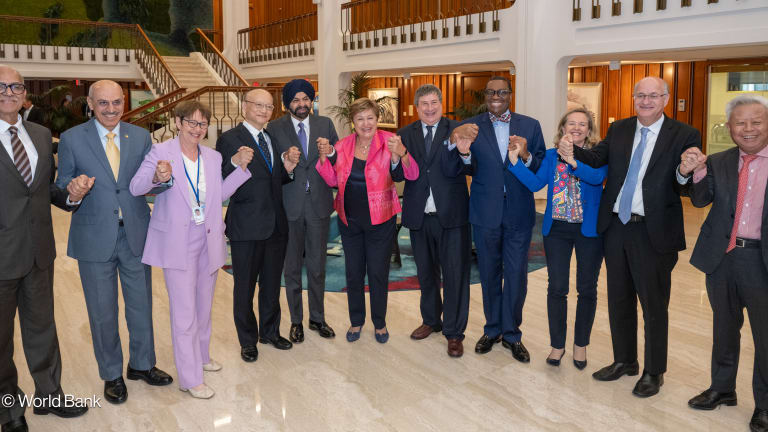
As the global community gathers in Argentina to mark the 40th anniversary of the United Nations Conference on Technical Cooperation among Developing Countries, we have an additional opportunity to discuss, debate, and design a reinvigorated international cooperation system.
And something as small as what is currently called “triangular cooperation” can take center stage in that system. Just like few imagined that the European Coal and Steel Community created in 1950 would grow into what the European Union is today, we think triangular cooperation’s future potential could very well dwarf its current status.
Women-focused CSOs to donors: Stop setting the agenda, start funding us
Most humanitarian grant-making infrastructure still fails to support women-focused groups on the ground, according to several experts.
Rather than rationalize business as usual, we believe triangular cooperation could give us, instead, wide space for unleashing new thinking about the promise and value of multipartner engagements to advance inclusive and sustainable development.
Shining the spotlight on triangular cooperation begins with understanding its rather marginal role thus far. An OECD Development Assistance Committee 2012 survey shows that most developing countries received less than $5 million in total triangular cooperation. We can point to several examples of diverse countries and organizations coming together to address development challenges. Just look at Austria, Kenya, Tanzania, and Uganda cooperating on a project from 2014-2016 to strengthen the capacities of East African NGOs to engage in policy dialogue.
But is triangular cooperation’s destiny to remain just a source of piecemeal illustrations on the margins?
As we consider this question and continue to raise the curtain on triangular cooperation, we need to take a closer look at the larger — and changing — context in which such cooperation acts.
A world focusing on the eradication of extreme poverty through bilateral financial transfers from donors to recipients is essentially a two-actor play with a narrow view in the end. That story fails to address other development challenges and to account for structural traps that together with extreme poverty hold people back, even in the face of significant development progress.
It disregards collective efforts to produce and preserve global and regional public goods. It also overlooks multiple and varied partners that are now on the stage, including China and India, as well as businesses, philanthropies, civil society, mayors, and other local leaders.
In short, with the adoption of the universal, multifaceted, and interrelated Sustainable Development Goals, the script for international cooperation is increasingly being redrafted to one that is designing, implementing, and assessing complex policies — and not just financial transactions — to advance both national sustainable development and global public goods.
This changing context built more and more on integrated, multidimensional, and multistakeholder approaches might very well present triangular cooperation with a new, leading role to play in connection with south-south cooperation. We have been witnessing a progression towards a multilayered and multilateral cooperation.
Indeed, as development is in transition toward the SDGs and as international cooperation evolves to embrace the changing scene, multilayered cooperation must move from the margins to the mainstream — from a supporting role to a leading one.
Countries facing development challenges bring different but complementary, roles. Middle-income countries, for instance, may have the freshest recollections of what it takes to address structural impediments to sustained development to share with least developed countries as they seek greater voice, action, and self-determination toward the same goal. Advanced economies have clear interests in an interconnected world to facilitate such smooth interactions toward greater sharing.
Like a sturdy three-legged stool, advanced, middle-income, and least-developed countries are critically important co-actors in cooperation and co-creators of shared impacts. Collectively, they could help transform triangular cooperation into a laboratory for testing, defining, and scaling up what works in international cooperation.
Taking stock of global development: What's working and what's stuck
After a week of conversations and events at the annual World Economic Forum in Davos, Devex's President and Editor-in-Chief Raj Kumar takes stock of the key issues in global development.
We recognize multilayered cooperation’s comparative strengths. Already, it is a mechanism for sharing and coordinating diverse knowledge and experiences amongst different actors on equal footing, drawing from the respective expertise and strengths of each. Already, it is a way of building trust — and with deeper trust the transaction costs of multilateral cooperation decrease.
If we seek to respond to collective challenges and global responsibilities, and address the corrosive burden that inequality imposes on all of our societies, then seeing triangular cooperation for what it actually is — namely, multipartner engagement — could very well give it a starring role.
Multipartner engagements for development can set in motion a virtuous cycle of interactions, where diverse development actors survey national and global challenges, match those needs to cooperation opportunities, assess if those cooperation strategies are working, and reaffirm or change underlying policies to respond to realities.
What lies at the heart of multipartner engagements is actually a partnership amongst equals built on joining forces to pursue joint work that taps the respective accumulated knowledge of each country involved to generate a whole that is greater than the sum of its parts and that leaves no one behind.
So, we want to be part of the cast discussing, debating, and designing triangular cooperation’s next act. Count us in.










